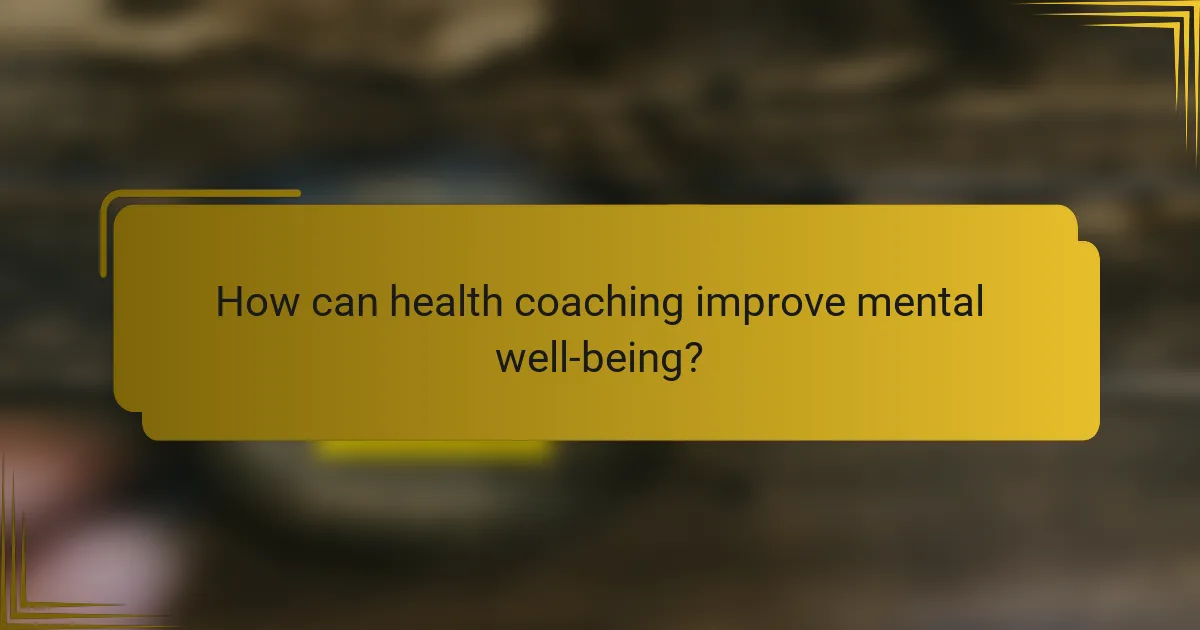Health coaching plays a vital role in enhancing mental well-being by offering personalized strategies to manage stress and achieve a balanced life. Through tailored support, coaches help individuals identify challenges, implement effective stress management techniques, and develop routines that foster both personal satisfaction and professional success.

How can health coaching improve mental well-being?
Health coaching can significantly enhance mental well-being by providing tailored strategies and support to manage stress and improve overall life satisfaction. Coaches work with individuals to identify personal challenges and develop actionable plans that promote mental health and resilience.
Personalized support
Personalized support in health coaching involves understanding an individual’s unique mental health needs and circumstances. Coaches often conduct assessments to identify stressors and emotional challenges, allowing for customized strategies that resonate with the individual.
This support can include regular check-ins, tailored resources, and encouragement, which help individuals feel understood and motivated. For instance, a coach might suggest specific coping mechanisms based on a client’s lifestyle and preferences.
Goal setting techniques
Effective goal setting techniques are crucial in health coaching for enhancing mental well-being. Coaches guide clients in establishing realistic, measurable, and time-bound goals that align with their mental health objectives.
For example, a client may set a goal to practice stress-reduction techniques for 10 minutes daily. This structured approach not only provides direction but also fosters a sense of achievement as clients reach their milestones.
Mindfulness practices
Incorporating mindfulness practices into health coaching can greatly improve mental well-being by promoting present-moment awareness and reducing anxiety. Coaches often teach techniques such as deep breathing, meditation, or guided imagery to help clients manage stress effectively.
Regular practice of mindfulness can lead to increased emotional regulation and a more positive outlook. Clients might be encouraged to spend a few minutes each day focusing on their breath or engaging in mindful walking to cultivate this skill.
Behavioral change strategies
Behavioral change strategies are essential in health coaching to facilitate lasting improvements in mental well-being. Coaches utilize various methods, such as cognitive-behavioral techniques, to help clients identify and modify negative thought patterns and behaviors.
For instance, a coach may assist a client in recognizing triggers for stress and developing alternative responses. By establishing new habits and routines, individuals can create a healthier lifestyle that supports their mental health over time.

What are effective stress management techniques?
Effective stress management techniques help individuals reduce stress levels and enhance overall mental well-being. These techniques can include various strategies such as breathing exercises, time management skills, and physical activity recommendations.
Breathing exercises
Breathing exercises are a simple yet powerful way to manage stress. Techniques like deep breathing or diaphragmatic breathing can help calm the nervous system and reduce anxiety. Practicing these exercises for just a few minutes daily can lead to significant improvements in stress levels.
To perform deep breathing, inhale slowly through your nose for a count of four, hold for four, and exhale through your mouth for a count of six. Repeat this cycle several times to enhance relaxation.
Time management skills
Effective time management skills are crucial for reducing stress by helping individuals prioritize tasks and allocate their time wisely. Techniques such as the Eisenhower Matrix can assist in distinguishing between urgent and important tasks, allowing for better focus on what truly matters.
Consider using tools like planners or digital calendars to keep track of deadlines and appointments. Setting specific time blocks for tasks can also prevent last-minute rushes and the stress that accompanies them.
Physical activity recommendations
Regular physical activity is a proven method for managing stress and improving mental health. Engaging in moderate exercise, such as brisk walking or cycling, for at least 150 minutes per week can significantly reduce stress levels and enhance mood.
Incorporating activities you enjoy, whether it’s dancing, swimming, or yoga, can make it easier to stick to a routine. Aim for at least 30 minutes of activity most days, and remember that even short bursts of movement can be beneficial.

How does health coaching promote work-life balance?
Health coaching promotes work-life balance by equipping individuals with tools and strategies to manage their time and energy effectively. Coaches help clients identify priorities, set boundaries, and create sustainable routines that support both personal and professional goals.
Boundary setting strategies
Boundary setting is essential for maintaining work-life balance. It involves clearly defining what is acceptable in both personal and professional contexts. For example, setting specific work hours can prevent job responsibilities from encroaching on personal time.
To establish effective boundaries, communicate your limits to colleagues and family. Use techniques like saying “no” to non-essential tasks or scheduling “do not disturb” periods to focus on personal activities.
Prioritization frameworks
Prioritization frameworks help individuals identify what tasks are most important, allowing them to allocate their time wisely. Popular methods include the Eisenhower Matrix, which categorizes tasks by urgency and importance, helping users focus on what truly matters.
Consider using a simple checklist to rank tasks daily. This can help you avoid feeling overwhelmed and ensure that critical responsibilities are addressed first, leading to a more balanced life.
Flexible scheduling options
Flexible scheduling allows individuals to adapt their work hours to better fit their personal lives. This could mean adjusting start and end times or incorporating remote work days to reduce commuting stress.
Employers increasingly offer flexible arrangements, which can lead to higher job satisfaction and productivity. Explore options like compressed workweeks or staggered hours to find a schedule that enhances your work-life balance.

What qualifications should a health coach have?
A qualified health coach should possess relevant certifications, practical experience, and possibly specializations in mental health. These qualifications ensure they can effectively support clients in achieving mental well-being, managing stress, and maintaining work-life balance.
Certification programs
Health coaches typically complete certification programs that are recognized by reputable organizations. Common certifications include those from the National Board for Health and Wellness Coaching (NBHWC) and the International Coach Federation (ICF). These programs often cover essential topics such as behavior change, nutrition, and coaching techniques.
When selecting a certification program, consider factors like the program’s accreditation, duration, and cost, which can range from a few hundred to several thousand dollars. Ensure that the program aligns with your career goals and the specific needs of your target clientele.
Relevant experience
Experience in health-related fields can significantly enhance a health coach’s effectiveness. Many successful coaches have backgrounds in areas such as nursing, psychology, or fitness training. This experience provides valuable insights into client needs and challenges.
Additionally, practical coaching experience, whether through internships, volunteer work, or personal coaching practice, is crucial. Engaging with clients allows coaches to refine their skills and develop a deeper understanding of effective strategies for promoting mental well-being and stress management.
Specializations in mental health
Specializing in mental health can set a health coach apart in a competitive field. Coaches may pursue additional training in areas such as mindfulness, cognitive behavioral techniques, or stress management strategies. These specializations enable coaches to address specific client concerns more effectively.
When considering specialization, evaluate the demand in your area and the types of clients you wish to serve. For instance, focusing on workplace stress management could be beneficial in corporate environments, while a focus on personal development may attract individual clients seeking balance in their lives.

How to choose the right health coach?
Selecting the right health coach involves assessing their approach, understanding client feedback, and being aware of pricing structures. A suitable coach should align with your personal goals and preferences while providing a clear pathway to improve your mental well-being, manage stress, and achieve work-life balance.
Assessing coaching styles
Coaching styles can vary significantly, so it’s essential to find one that resonates with you. Some coaches focus on a directive approach, providing specific advice and strategies, while others may adopt a more facilitative style, encouraging self-discovery and personal insight.
Consider what works best for you: do you prefer structured sessions with clear goals, or do you thrive in a more open-ended environment? Many coaches offer introductory sessions, which can help you gauge their style before committing.
Evaluating client testimonials
Client testimonials provide valuable insights into a coach’s effectiveness and approach. Look for reviews that highlight specific outcomes, such as improved stress management or enhanced work-life balance, as these will give you a clearer picture of what to expect.
Pay attention to the diversity of testimonials. A coach who has successfully worked with a variety of clients may be more adaptable to your unique needs. Online platforms often feature ratings and reviews, making it easier to compare different coaches.
Understanding pricing structures
Health coaching prices can vary widely, typically ranging from $50 to $300 per session, depending on the coach’s experience and location. Some coaches offer packages that reduce the per-session cost, which can be a more economical option if you plan to engage in multiple sessions.
Be sure to clarify what is included in the pricing. Some coaches may provide additional resources, such as meal plans or access to online support groups, which can enhance the overall value of their services. Always ask about cancellation policies and payment plans to avoid any surprises later on.

What are the benefits of group health coaching?
Group health coaching offers numerous benefits, including enhanced motivation, accountability, and a sense of belonging. Participants often find that sharing their journeys with others leads to improved mental well-being and effective stress management.
Community support
Community support is a cornerstone of group health coaching, providing participants with a network of encouragement and understanding. Being part of a group fosters connections that can help individuals feel less isolated in their health journeys.
Support from peers can be particularly beneficial during challenging times, as group members can share resources, advice, and emotional backing. This collective strength often leads to increased commitment to personal health goals.
Shared experiences
Shared experiences in group health coaching create a platform for learning and growth. Participants can exchange insights about their struggles and successes, which can lead to new strategies for managing stress and achieving work-life balance.
Hearing how others navigate similar challenges can inspire individuals to adopt new approaches or reinforce existing habits. This exchange of experiences often cultivates a collaborative atmosphere that enhances overall well-being.
